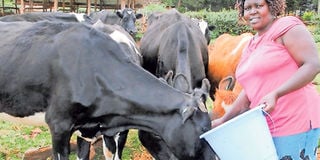Brief news on farming and agribusiness in the country

A farmer feeds her dairy cattle in her farm in Elburgon. Counties in western Kenya have been put on high alert following an outbreak of foot and mouth disease. FILE PHOTO | NMG
What you need to know:
- The symptoms of the airborne disease include fever, blisters in the mouth and on the feet, a drop in milk production, loss of appetite and weight, quivering lips, frothing at the mouth and limping.
- Agriculture executive Gilchrist Okuom said that though there are no cases yet reported in Kisumu, they are monitoring areas in West Nyakach.
- Dr Virginia Kimani, the lead consultant at the Pesticides and Agricultural Resource Centre, said pesticide usage is on the rise but most farmers misuse them. In the 2017/18 fiscal year, the country imported 17.8 metric tonnes of pesticide valued at Sh13 billion.
- Prof Muigai, who is also a member of the African Union Animal Genetic Resources Taxonomy Advisory Group, was among 15 experts recognised yesterday by the African Union for her input.
Counties on high alert over foot and mouth disease outbreak
Counties in western Kenya have been put on high alert following an outbreak of foot and mouth disease.
Kisii County has already announced a quarantine to prevent the spread of the disease that affects cows, pigs, goats and sheep.
The symptoms of the airborne disease include fever, blisters in the mouth and on the feet, a drop in milk production, loss of appetite and weight, quivering lips, frothing at the mouth and limping.
Homa Bay Agriculture executive Juma Aguko said that the department is doing surveillance in livestock markets to ensure the disease is controlled.
Most livestock markets in Homa Bay County receive animals from Migori and Kisii counties and as far Tanzania, coming through Miuru border point.
“We have hired veterinary officers to carry out surveys in livestock markets in Rodi and Ndhiwa, which trade animals from other counties. Members of the community are also helping us monitor the situation,” said Aguko.
The executive noted going by past trends, the disease does not spread during the rainy season.
“For the past few days, we have experienced a heavy downpour and this could be our saving grace for now,”
He warned that the county would ban trade in livestock should there be an outbreak of the viral disease.
Agriculture executive Gilchrist Okuom said that though there are no cases yet reported in Kisumu, they are monitoring areas in West Nyakach.
“Lower Nyakach is prone to foot and mouth disease because animals easily cross over from Homa Bay during market days,” said Okuom.
In February, Siaya banned livestock trade in Aram, Akala and Bondo to contain the disease, whose treatment and vaccination are available.
-Elizabeth Ojina
****
Use pesticides correctly, farmers told
Chemical experts have asked farmers to observe due diligence when applying glyphosate-based products due to their toxicity to avoid health complications.
Glyphosate is a compound used in making pesticides, which has been cited as carcinogenic. The experts during a recent meeting in Naivasha urged farmers to always follow instructions while using all agricultural chemicals.
Dr Virginia Kimani, the lead consultant at the Pesticides and Agricultural Resource Centre, said pesticide usage is on the rise but most farmers misuse them. In the 2017/18 fiscal year, the country imported 17.8 metric tonnes of pesticide valued at Sh13 billion.
“We have no choice but to use pesticides. They should, however, be used safely and responsibly as specified in their packaging,” said Kenya National Academy of Sciences honorary secretary Ratemo Michieka.
There are, according to the experts, more than 70 registered glyphosate-based herbicides, pesticides, fungicides, insecticides and other pest and weed management compounds used in the country, including the much debated Roundup.
“All these are critical for the country’s food security. Their correct usage is also important,” said Peter Opiyo, the Pest Control Products Board CEO.
“Without pesticides, farmers would be registering losses. But the pesticides and herbicides are also toxic and should be used safely and handled with utmost care. We have so far not yet found a conclusive link between glyphosate and health complications,” said Opiyo.
Kenya Network of Cancer Organisations executive director Christine Mugo-Sitati suggested that there should be more research on the safety of herbicides and pesticides, rather than making a blanket declaration that some of them are unsafe.
-Brian Okinda
****
Varsity don awarded for coming up with animal genetic monitoring tool
Jomo Kenyatta University of Agriculture and Technology lecturer Anne Muigai has been honoured for her role in the development of the Animal Genetic Resource Characterisation and Inventory and Monitoring (AnGR-CIM) tool for Africa.
Prof Muigai, who is also a member of the African Union Animal Genetic Resources Taxonomy Advisory Group, was among 15 experts recognised yesterday by the African Union for her input.
The award was presented to her by ambassador Josefa Correia Sacko, the Commissioner for Rural Economy and Agriculture of the African Union, and the Agriculture Cabinet Secretary Mwangi Kiunjuri.
The AnGR-CIM is Africa’s first comprehensive paperless data capture tool designed to provide a platform for collecting robust information across African member states on indigenous animal genetic resources.
“The AnGR-CIM tool will now be used to collect accurate and up to date data,” said Sacko.
Prof Muigai was thankful for being given a chance to work on the tool to help farmers.
-Brian Okinda





